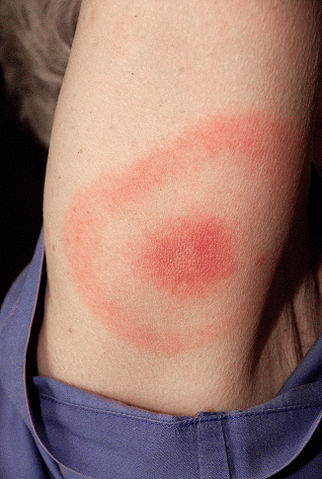 |
This is a file from the Wikimedia Commons. Information from its description page there is shown below.
Commons is a freely licensed media file repository. You can help.
|
| Description |
Česky: Erytema migrans při lymeské borrelióze
Deutsch: Das Erythema migrans fällt meistens nicht so typisch aus wie in diesem Bild.
English: This 2007 photograph depicts the pathognomonic erythematous rash in the pattern of a “bull’s-eye”, which manifested at the site of a tick bite on this Maryland woman’s posterior right upper arm, who’d subsequently contracted Lyme disease. Lyme disease patients who are diagnosed early, and receive proper antibiotic treatment, usually recover rapidly and completely. A key component of early diagnosis is recognition of the characteristic Lyme disease rash called erythema migrans. This rash often manifests itself in a “bull's-eye” appearance, and is observed in about 80% of Lyme disease patients. Lyme disease is caused by the bacterium Borrelia burgdorferi, and is transmitted to humans by the bite of infected blacklegged ticks. Typical symptoms include fever, headache, fatigue, and as illustrated here, the characteristic skin rash called erythema migrans. If left untreated, infection can spread to joints, the heart, and the nervous system. Note that there are a number of PHIL images related to this disease and its vectors.
Français : érythème migrant, typique, mais non systématique en cas de maladie de Lyme transmise par piqûre de tique.
Polski: Rumień wędrujący. Erythema migrans.
Nederlands: Erythema migrans.
Türkçe: Kene ısırığına hedef olmuş cildin görünümü.
|
| Date |
2007 |
| Source |
 |
This media comes from the Centers for Disease Control and Prevention's Public Health Image Library (PHIL), with identification number #9875. Note: Not all PHIL images are public domain; be sure to check copyright status and credit authors and content providers.
|
|
| Author |
- Photo Credit: James Gathany
- Content Providers(s): CDC/ James Gathany
|
Permission
( Reusing this file) |
| Public domainPublic domainfalsefalse |
 |
This image is a work of the Centers for Disease Control and Prevention, part of the United States Department of Health and Human Services, taken or made as part of an employee's official duties. As a work of the U.S. federal government, the image is in the public domain.
česky | Deutsch | English | español | eesti | suomi | français | italiano | македонски | Nederlands | polski | português | slovenščina | 中文 | 中文(简体) | +/−
|
|
English: None - This image is in the public domain and thus free of any copyright restrictions. As a matter of courtesy we request that the content provider be credited and notified in any public or private usage of this image.
|
File usage
The following pages on Schools Wikipedia link to this image (list may be incomplete):
This file contains additional information, probably added from the digital camera or scanner used to create or digitize it. If the file has been modified from its original state, some details may not fully reflect the modified file.
Wikipedia for Schools is designed to make learning fun and easy. In 133 nations around the world, SOS Childrens Villages works to bring better education and healthcare to families in desperate need of support. Have you thought about sponsoring a child?




